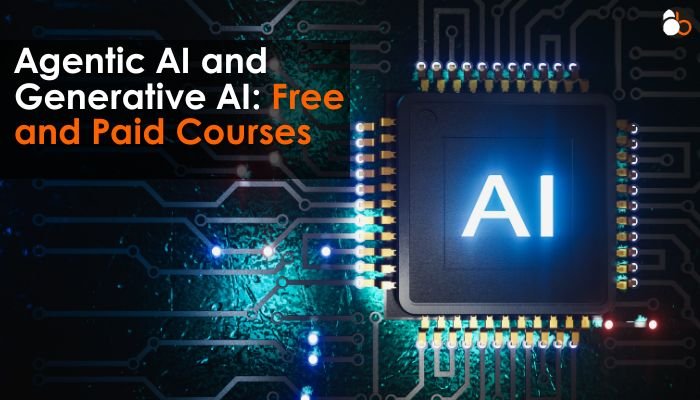This article provides a curated list of free and paid online courses to learn about Agentic AI and Generative AI, two rapidly evolving fields in artificial intelligence. These courses are sourced from popular online learning platforms like Coursera, edX, Udemy, and Udacity. Whether you’re a beginner or an experienced AI enthusiast, this comprehensive list will help you find the perfect course to enhance your knowledge and skills.
Agentic AI
Agentic AI refers to AI systems designed to act autonomously and achieve specific goals. These AI agents can perceive their environment, make decisions, and take actions to achieve their objectives. They are becoming increasingly important in various applications, including robotics, customer service, and personalized recommendations. As AI technology advances, there is a growing demand for professionals skilled in developing and deploying AI agents to automate complex tasks and optimize decision-making processes across various industries.
Free Resources for Learning Agentic AI
| Resource | Provider | Description |
|---|---|---|
| Introduction to Artificial Intelligence (AI) | Coursera | This course provides a foundational understanding of AI concepts, including search algorithms, knowledge representation, and reasoning, which are essential for understanding agentic AI. |
| AI for Everyone | Coursera | Taught by Andrew Ng, this course provides a comprehensive overview of AI and explores its applications across various industries. It’s a great starting point for anyone interested in AI, including agentic AI. |
| Agentic AI and AI Agents: A Primer for Leaders | Coursera | This course provides a good introduction to how AI agents can be used in business to automate tasks, improve decision-making, and enhance customer experiences. |
| ChatGPT & Zapier: Agentic AI for Everyone | Coursera | This course teaches how to create AI agents using ChatGPT and Zapier for automating daily tasks, such as managing expenses and scheduling, without requiring any programming skills. |
| Elements of AI | University of Helsinki | This course introduces the basics of AI, covering topics like machine learning, neural networks, and societal implications. It provides a solid foundation for understanding the broader context of agentic AI. |
| Machine Learning Crash Course | Google AI | This crash course offers a practical introduction to machine learning, a core component of agentic AI. It covers key concepts and techniques with a focus on hands-on learning. |
| Artificial Intelligence: Principles and Techniques | Stanford University | This course delves into the core principles and techniques of AI, including search, logic, and probabilistic reasoning, which are fundamental to building agentic AI systems. |
| CS50’s Introduction to Artificial Intelligence with Python | Harvard University | This course provides a comprehensive introduction to AI using Python. It covers various AI topics, including search, optimization, and machine learning, with a focus on practical applications. |
| Deep Learning Specialization | Coursera | This specialization explores deep learning, a powerful technique used in many agentic AI systems. It covers neural networks, convolutional networks, and recurrent networks, providing a solid foundation for building advanced AI agents. |
| Fast.ai | Practical Deep Learning for Coders | This course offers a practical approach to deep learning, focusing on building and deploying deep learning models. It’s a valuable resource for those interested in developing agentic AI systems that leverage deep learning. |
| OpenAI | Resources and tutorials on various AI topics | OpenAI provides various resources and tutorials on different AI topics, including reinforcement learning and language models, which are relevant to agentic AI. For example, they offer information on LangGraph, a tool for building graph-based AI systems, including agent-based architectures, and NVIDIA’s techniques for designing high-performance AI agents for specialized applications. |
| TensorFlow Tutorials | TensorFlow is a popular deep learning library, and these tutorials provide hands-on experience with building and training deep learning models, which can be used in agentic AI systems. |
Paid Courses for Learning Agentic AI
| Course | Provider | Description |
|---|---|---|
| AI for Business Specialization | Coursera | This specialization explores the applications of AI in business, including how agentic AI can be used to automate tasks, improve decision-making, and enhance customer experiences. |
| Machine Learning A-Z™: Hands-On Python & R In Data Science | Udemy | This comprehensive course covers machine learning techniques using Python and R, providing a strong foundation for building agentic AI systems that rely on data analysis and decision-making. |
| Artificial Intelligence Nanodegree | Udacity | This nanodegree program provides a comprehensive curriculum covering various AI topics, including search, planning, and machine learning, with a focus on building AI agents. |
| Deep Reinforcement Learning Nanodegree | Udacity | This nanodegree program focuses on deep reinforcement learning, a powerful technique for training AI agents to interact with their environment and learn optimal strategies. It explores applications in robotics, gaming, and finance 2. |
| Advanced Machine Learning Specialization | Coursera | This specialization delves into advanced machine learning techniques, including deep learning, reinforcement learning, and natural language processing, which are relevant to building sophisticated agentic AI systems. |
| Building Agentic RAG with LlamaIndex | Coursera | This course focuses on building intelligent research agents using LlamaIndex, enhancing data analysis with tool use, reasoning, and decision-making capabilities across multiple documents. |
| Intro to AI Agents: Build an Army of Digital Workers with AI | Udemy | This course provides a comprehensive overview of various AI agent platforms, including CrewAI, Perplexity AI, AutoGen, AutoGPT, and more. |
| AI Agents: Building Teams of LLM Agents that Work For You | Udemy | This course focuses on building and deploying LLM-based AI agent applications, covering topics such as AutoGen, ChatGPT API, Streamlit, and Google Cloud. |
| Mastering AI Agents for Databases | Packt | This course teaches how to build AI agents for database management using LangChain and OpenAI. It covers creating custom solutions for CSV and SQL databases, implementing function calling, and developing interactive interfaces using Streamlit. |
| Data Science and Machine Learning Bootcamp with R | Udemy | This bootcamp provides a comprehensive introduction to data science and machine learning using R, equipping learners with the skills to analyze data and build AI models, including those used in agentic AI. |
| Complete Machine Learning & Data Science Bootcamp 2023 | Udemy | This bootcamp covers a wide range of machine learning and data science topics, providing a solid foundation for understanding and building agentic AI systems. |
| The Data Science Course: Complete Data Science Bootcamp | Udemy | This comprehensive data science bootcamp covers various data analysis and machine learning techniques, which are essential for building data-driven agentic AI systems. |
| Data Science: Machine Learning, Data Analysis & Python | Udemy | This course focuses on data science and machine learning using Python, providing learners with the skills to analyze data and build AI models, including those used in agentic AI. |
| Machine Learning, Data Science and Deep Learning with Python | Udemy | This course covers machine learning, data science, and deep learning using Python, providing a comprehensive foundation for building agentic AI systems. |
Generative AI
Generative AI focuses on creating new content, such as images, text, music, and even code. It has gained significant attention with the rise of models like DALL-E 2 and GPT-3, which can generate incredibly realistic and creative content 7. This technology has the potential to revolutionize various creative fields, including art, music, and writing, by enabling new forms of expression and content creation 7. However, it also raises ethical considerations, such as the potential for misuse and the importance of responsible development 7.
Free Resources for Learning Generative AI
| Resource | Provider | Description |
|---|---|---|
| Generative Adversarial Networks (GANs) Specialization | Coursera | This specialization explores Generative Adversarial Networks (GANs), a powerful class of generative models. It covers the theory and implementation of GANs, enabling learners to generate realistic images and other content. |
| Introduction to Generative AI | Google AI | This introductory resource provides an overview of generative AI, its applications, and different types of generative models. |
| Generative AI – A Way of Life | Analytics Vidhya | This course provides a beginner-friendly introduction to generative AI tools and their applications in various industries, from content creation to marketing and more. |
| Generative AI for Beginners | Microsoft | This course covers the basics of generative AI and its applications with Python and TypeScript. It includes lessons on prompt engineering, LLMs, GPTs, and more. |
| The Illustrated Transformer | Jay Alammar | This blog post provides a visual and intuitive explanation of the Transformer model, a key architecture used in many generative AI models like GPT-3. |
| Hugging Face | Transformers library and tutorials | Hugging Face provides a comprehensive library of pre-trained Transformer models and tutorials on how to use them for various generative AI tasks. |
| Deep Dream Generator | Online tool for generating AI art | This online tool allows users to generate AI art using deep learning algorithms, providing a hands-on experience with generative AI. |
| Artbreeder | Online tool for creating and modifying AI-generated images | This online tool enables users to create and modify AI-generated images, exploring the creative potential of generative AI. |
| This Person Does Not Exist | Website showcasing AI-generated faces | This website showcases realistic AI-generated faces, demonstrating the capabilities of generative AI in creating synthetic data. |
| GPT-3 Demo | OpenAI’s GPT-3 language model demo | This demo allows users to interact with GPT-3, a powerful language model that can generate human-like text, showcasing the potential of generative AI in natural language processing. |
| Google Colaboratory | Free cloud-based platform for running AI code | Google Colaboratory provides a free cloud-based platform for running AI code, including generative AI models, making it accessible to anyone with an internet connection. |
| Kaggle | Platform for data science competitions and datasets | Kaggle hosts various data science competitions and datasets, including those related to generative AI, providing opportunities to learn and practice generative AI techniques. |
Paid Courses for Learning Generative AI
| Course | Provider | Description |
|---|---|---|
| Natural Language Processing Specialization | Coursera | This specialization explores natural language processing (NLP), a key area of generative AI. It covers various NLP techniques, including language modeling, text generation, and machine translation. |
| [2025] Tensorflow 2: Deep Learning & Artificial Intelligence | Udemy | Machine Learning & Neural Networks for Computer Vision, Time Series Analysis, NLP, GANs, Reinforcement Learning, +More! |
| Supervised learning for AI with Python and TensorFlow 2 | Udemy | Uncover the Concepts and Techniques to Build and Train your own Artificial Intelligence Models |
| Mastering Generative AI with Python and TensorFlow | Udemy | This course provides a comprehensive guide to generative AI using Python and TensorFlow. It covers various generative models and their applications, including image generation, text generation, and music generation. |
| Building Generative AI Applications with Python | Coursera | This course focuses on building practical generative AI applications using Python. It covers various use cases, including AI art generation, text summarization, and code generation. |
| Generative Adversarial Networks (GANs) Masterclass | Udemy | This masterclass delves into the intricacies of GANs, covering advanced topics and techniques for generating high-quality synthetic data. |
| Mastering Generative AI and ChatGPT | GeeksforGeeks | This course offers a comprehensive overview of generative AI concepts and practical applications, including hands-on sessions and expert guidance. |
| Generative AI Unleashed: Exploring Possibilities and Future | Udemy | This course explores the principles, techniques, and applications of generative AI, covering topics such as creating intelligent data-driven models, ethical considerations, and future trends. It also delves into real-world applications in fields like art, healthcare, gaming, and business 9. |
| Deep Learning: Advanced Computer Vision | Coursera | This course explores advanced computer vision techniques, including generative models for image synthesis and manipulation, which are relevant to generative AI applications in computer vision. |
| Computer Vision Nanodegree | Udacity | This nanodegree program provides a comprehensive curriculum covering various computer vision topics, including image generation and object detection, with a focus on deep learning techniques. |
| Self-Driving Car Engineer Nanodegree | Udacity | This nanodegree program explores the application of AI in self-driving cars, including the use of generative models for perception and planning. |
| AI for Medicine Specialization | Coursera | This specialization explores the applications of AI in medicine, including the use of generative models for medical image analysis and drug discovery. |
Conclusion
This article presents a diverse selection of learning resources for those interested in delving into the world of Agentic AI and Generative AI. The courses and resources listed cater to various learning styles and levels, from free introductory courses to comprehensive paid programs. Notably, there is a growing emphasis on the practical applications of AI, with many courses focusing on building and deploying AI agents and generative models. This trend reflects the increasing demand for AI professionals who can translate theoretical knowledge into real-world solutions.
When choosing a course, consider your learning goals, preferred learning style, and prior experience with AI. If you’re new to AI, starting with a free introductory course can provide a solid foundation before investing in a paid program. For those seeking to specialize in a particular area, such as natural language processing or computer vision, consider courses that delve deeper into those specific domains. With the rapid advancements in AI, continuous learning is essential to stay ahead in this dynamic field.







